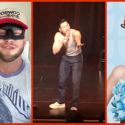
PowerPoint presentations. A one-minute video (starring Air Force Chief of Staff Gen. Norton Schwartz and Chief Master Sergeant of the Air Force James Roy!). A question-and-answer pamphlet FAQ. Maybe even a little role playing. All shoved into a single hour of training for America’s 1.4 million active duty servicemembers spread across five branches. Your first instinct might be to ask whether this post-DADT training can be effective. Or, you know, it might be to ask whether it’s even freakin’ necessary.
Because both gay and (ostensibly) straight airmen don’t think so.
J.D., a gay Air Force officer who declined to give his full name due to the ongoing repeal process [and who is not, in fact, this very blogger], said that he recently took the training and thought the whole process was unnecessary. Most airmen, especially the younger generation, are OK serving with gay, lesbian and bisexual colleagues, he said. “They’re making a mountain out a molehill,” said J.D., also an OutServe co-founder. “You just need to say, ‘Respect one another.’” [Air Force spokesman Maj. Joel] Harper said surveys of airmen back up J.D’s view, but “our force does have questions about how this change in policy will affect them.”
Senior Airman Garrett Pipes of Fort Meade, Md., found the training inadequate, saying instruction should consist of more than material that’s easy to skip. “This transition is going to be incredibly tough on the men and women in uniform, and the training should be in a format that ensures full understanding of the material,” Pipes said.
[…] The instruction materials also cover topics such as what benefits same-sex partners are eligible to receive. Gay, lesbian and bisexual airmen are eligible for benefits as single service members. J.D. said seeing during training all of the benefits he still couldn’t receive as a gay service member made him feel like a “second-class citizen.” The one thing about training that made him feel better was actually seeing instruction happening. “When I first started taking the training, I was like, ‘Oh, man, we’re actually going to see the repeal happen in the next few months,’” he said.
Hmmm. Perhaps, then, the U.S. military should concentrate its training efforts not on what life will be like after gays are allowed to serve openly, but what type of gay-ish behavior can still get you kicked out of the armed forces.
A SAMPLE OF THE AIR FORCE’S TRAINING GUIDELINES:
How about we take this to the next level?
Our newsletter is like a refreshing cocktail (or mocktail) of LGBTQ+ entertainment and pop culture, served up with a side of eye-candy.
Enforcement. Behavior that violates military standards of conduct will be regulated through the Uniform Code of Military Justice. Personal and professional standards of conduct will be enforced regardless of sexual orientation.
Disagreeing with the repeal. You can continue to hold your beliefs and practice your religion freely, but you have to treat everyone with dignity regardless of sexual orientation.
You can also express your beliefs on sexual orientation in appropriate circumstances within the limits of law and policy. However, you can’t say anything that would be detrimental to good order and discipline.
Changing duty assignments. You can’t refuse duty or duty assignments, and you must follow orders involving others who are gay, lesbian or bisexual.
Early discharges. The Defense Department isn’t going to allow early discharges based on objections to the repeal, although you can make a request to be voluntarily discharged. Current policy states that discretionary discharge is granted only when the Air Force secretary believes early separation is in the service’s best interests.
Housing. Assignments will not be changed to segregate airmen based on sexual orientation.
Domestic partner benefits. Gay, lesbian and bisexual service members are eligible for benefits as single service members. The Defense of Marriage Act and current benefit laws mean that the Defense Department can’t extend benefits such as dependent medical coverage, dependent-rate Basic Allowance for Housing, and dependent-rate allowances for travel, transportation and separation.
Handling complaints. Gay, lesbian and bisexual airmen are treated under the same principles of military equal opportunity, or MEO, as their straight counterparts.
But they can’t resolve problems related to their sexuality through the MEO complaint-resolution process, which airmen can use for complaints related to race, color, religion, national origin or sex. Instead, they must go through means such as the chain of command and the Air Force inspector general.
Chaplains. If chaplains can’t reconcile caring for gay airmen with their faith, they can ask their endorsing agency to withdraw ecclesiastical endorsement. That would lead to an administrative separation from the Air Force.
[Air Force Times; photo: of a different type of Air Force training, via]


















[email protected]
A MONTH AGO TODAY, gay Cpl. Andrew Wilfahrt was killed fighting for Freedom that had not yet rung for him and other gay and lesbian service members. This is NOT “post-DADT training.” Though the “repeal” bill was signed over three months ago, it is STILL law, and, “The reality is that investigations continue and service members are still in danger of being discharged.” – SLDN, March 24, 2011.
[img]http://www.southfloridagaynews.com/images/stories/issues/v2i11/pass.jpg[/img]
As his proud parents have revealed, Cpl. Wilfahrt’s immediate band of brothers did not care that he was gay, but the Pentagon—which REPORTS TO their Commander-in-Chief, aka our President and self-annointed “Fierce Advocate”—DOES, and, thus, patriots like Andrew Wilfahrt continue to be killed looking not just over their shoulders for the official enemy but for those in their own government who might add them to the number still being subjected to investigation and fear of discharge.
Because of this foot-dragging charade of so-called “training,” the EARLIEST the ban might now actually end is OCTOBER—nearly a year after the bill was passed.
“The Pentagon could easily repeal the ban TODAY if there was the POLITICAL will. [Army Chief of Staff Gen. George] Casey in particular is leaving soon and doesn’t want to be known as the Army chief of staff who let gays in on his watch. THE FOOT-DRAGGING IS NOT ABOUT SOME SINCERE OR LEGITIMATE SENSE THAT THE TROOPS NEED TO BE TRAINED ON HOW TO DEAL WITH GAYS; it’s because they don’t want to be around when the policy happens’.” – Palm Center Director Aaron Belkin, Washington Blade, January 6, 2011.
“I am baffled by the length of time that the Army says it is going to take for our soldiers and other personnel to be trained in order for certification to take place and repeal to be enacted. I am embarrassed, because this reflects badly on the senior leadership of the Army. What has taken other countries days and weeks to accomplish — and is taking other branches of the armed services months less to implement — is taking the Army the better part of a year. I have reviewed the training materials being used and, as a retired senior leader, I can say with certainty that there is no legitimate reason it should take until August for training to be completed and certification to take place. Such a schedule would mean that full repeal would not be effective until October—10 months after the president signed the repeal legislation. THAT IT WOULD TAKE A MILITARY THAT CAN GO HALFWAY AROUND THE WORLD TO UNSEAT A DICTATOR IN 30 DAYS MORE THAN SIX MONTHS TO COMMUNICATE SUCH A SIMPLE SET OF FUNDAMENTAL MORAL PRINCIPLES TO ITS FORCE IS UNACCEPTABLE AND UNNECESSARY.” – Maj. Gen. Dennis Laich (retired), Cochair, SLDN’s Military Advisory Council, Stars & Stripes, March 25, 2011.
“This training is not rocket science. THE SERVICES CAN GET THIS DONE BY APRIL 30TH. It’s simply taking too long, and it’s time to speed up the process.” – Aubrey Sarvis, Executive Director, SLDN, March 22, 2011.
The fight against the ban is NOT over, yet virtually all of Gay, Inc., and the Community have abandoned the battlefield AND their gay brothers and sisters still on actual battlefields and bases around the world—to “training” that is less a joke than a shame.
[img]http://a7.sphotos.ak.fbcdn.net/hphotos-ak-ash4/199813_1453817565081_1822575019_841991_5013135_n.jpg[/img]
Andrew Wilfahrt’s body is returned to his family at Dover Air Force Base.
JOhn
It is sensitivity training more or less. FYI – http://OutMilitary.com is providing a supportive place for gay servicemen and women to friend, share and network in a post DADT era.